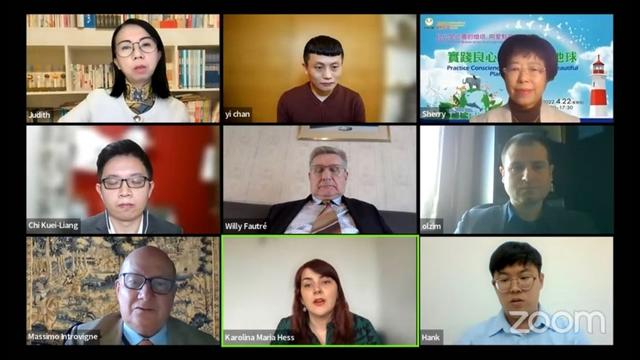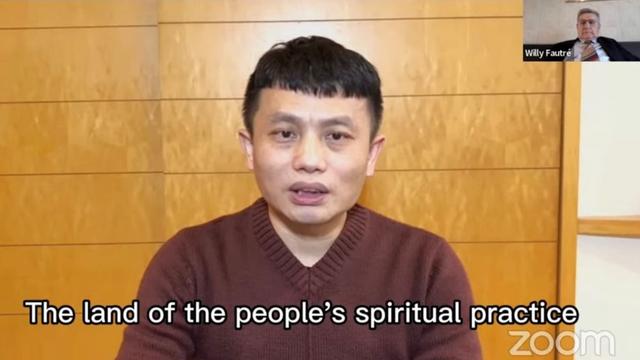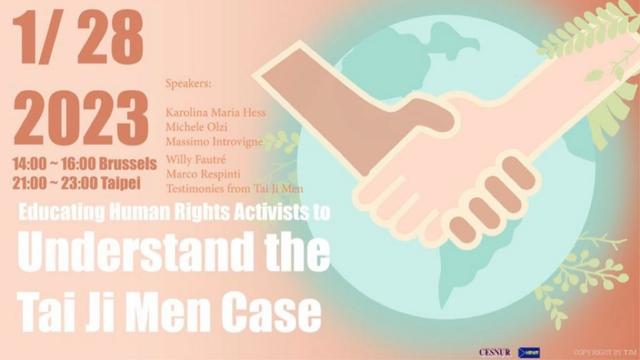Scholars and human rights activists praised Tai Ji Men’s role in spreading conscience education, and denounced the movement’s continuing tax harassment.
by Daniela Bovolenta
After the International Day of Education (January 24), on January 28, 2023, CESNUR and Human Right Without Frontiers organized one of their bi-monthly webinars on the Tai Ji Men case, with the title “Educating Human Rights Activists to Understand the Tai Ji Men Case.”

Karolina Maria Hess, a researcher at the Center for Comparative Studies of Civilizations, Jagellonian University, Krakow, Poland, introduced the webinar by reminding the audience of the meaning of the International Day of Education, and the right of all human beings to have access to adequate education. She emphasized two fundamental connections between the International Day of Education and Tai Ji Men. The first is the important role Tai Ji Men and its Shifu (Grand Master), Dr. Hong Tao-Tze, play in spreading internationally the idea that there can be no peace education without education to the key role of conscience. The second, Hess said, and the one mentioned in the very title of the webinar, is the need to educate even more politicians, academics, journalists, and the global human rights community to understand how the Tai Ji Men case is one of the main cases in the democratic world today where freedom of religion or belief is at stake.
Hess then presented a video where António Guterres, Secretary General of the United Nations, affirmed the universal right not only to education but to quality education, without discriminations based on gender (such as those unfortunately prevailing in Afghanistan today), race, or religion.

Hess continued by introducing the first two speakers, both Italian: Michele Olzi, a teaching assistant and research fellow at the University of Insubria, and Massimo Introvigne, a sociologist who serves as managing director of CESNUR and editor-in-chief of Bitter Winter.
Olzi discussed the notion of “collective imaginaries” that support communities and countries. He explained that bells are important in the collective imaginaries of different cultures, as attested for the example by the U.S. Liberty Bell in Philadelphia and the bells of certain European cathedrals who have become national symbols. One special bell, Olzi said, is the Bell of World Peace and Love devised by Dr. Hong, a powerful sign that creates a collective imaginary centered on conscience, love, and peace, not only for one country but for all our globalized world.

Collective imaginaries, Olzi said, may also become impoverished or damaged when injustice is systematically perpetrated. This happened in Taiwan with the Tai Ji Men case. But even there, he concluded, the Bell of World Peace and Love continues to remind us that rectifying injustice, although difficult, should never be regarded as impossible.
Introvigne reminded the audience that in a previous webinar he had mentioned French pioneer sociologist Émile Durkheim as the founder of a sociology of solidarity. He also founded sociology of education, Introvigne said, through a course he taught in 1904 and 1905. However, he never published the text of the course during his lifetime because he believed his ideas on the subject might be regarded as too controversial. While Durkheim acknowledged that education in the modern sense of a coherent whole started with Christianity, he criticized both the Catholic and the secular (and often anti-religious) education that existed in France at his time. A secular scholar himself, he struggled with the problem how to offer a coherent education in a non-religious context.
Introvigne expressed the opinion that, while public schools should not proselytize for any religion, their education cannot be totally separated from religious culture and from spiritual and moral values. Dr. Hong and Tai Ji Men, Introvigne said, offer a solution to Durkheim’s dilemma, which in a way has not been solved to this very day, by proposing conscience education as the center of any meaningful educative project. Conscience education, Introvigne concluded, is also a safeguard against corruption, which explains why corrupt bureaucrats and politicians harassed and persecuted Tai Ji Men.
The full video of the webinar.
Willy Fautré, co-founder and director of Human Rights Without Frontiers, chaired the second session of the webinar. He first presented a video where a young dizi (disciple) of Tai Ji Men who participated in the street protests in Taiwan powerfully expressed the movement’s demand for justice. Fautré noted the connection between Tai Ji Men’s struggle for justice and the international combat to guarantee access to education to all those to whom it is denied by regimes practicing various forms of discrimination.
Fautré then introduced the testimonies of five dizi. Sherry Chen, a retired elementary teacher, mentioned the words of Richard Charles Levin, the former President of Yale University, who once said that he would regard Yale education as a failure if it would teach to its students only excellent professional knowledge and skills. Levin believed that, above all, Yale should taught students to think critically and independently. Chen said that this was precisely what she learned in Tai Ji Men. Her mother, due to the patriarchal society prevailing in Taiwan during the Japanese occupation, was never able to be schooled as she would have liked. Nonetheless, she received what she regarded as the essential part of a good education by becoming a Tai Ji Men dizi. Chen also concurred with other speakers in commenting that some rogue bureaucrats do not like independent thinking, and this is one of the reason Tai Ji Men was unjustly persecuted.

Chiu Yi-Chan, an officer in Taiwan’s Army, mentioned that when in 2010 he participated in Tai Ji Men protests, another dizi warned him that by doing so Chiu could be discharged from the military and lose his pension. He answered that he was willing to sacrifice his career, if needed, to protect not only Tai Ji Men but Taiwan itself from the dramatic consequences of injustice. Chiu revisited some key features of the Tai Ji Men case. He concluded by mentioning the December 2022 conviction of 97-year-old Irmgard Furchner, who was convicted by a German court for her complicity with Nazi atrocities when she was the secretary of the commander of the Stutthof concentration camp.
The interesting part of the trial, Chiu said, is that Furchner did not claim she was innocent and expressed remorse for what she did. For the survivors and the victims’ relatives, this was important. Without comparing what are obviously different levels of injustice, Chiu concluded that it would be important for the victims of the 1996 repression of Tai Ji Men that those responsible for it would admit that what they did was wrong. Unfortunately, this is not happening.

Judith Chiu, who works as channel director for an international software company, honored both her primary school teacher, Chang Man-Chang, who had a key role in her education, and Dr. Hong Tao-Tze, who taught her the central role of conscience education and lifelong learning. She also expressed her surprise at the fact that a spiritual movement that helped so many Taiwanese was harassed and persecuted for more than 26 years. She called on the government of Taiwan to quickly solve the Tai Ji Men case, so that its Shifu and dizi can focus on their global efforts for peace and conscience education.
Craig Chi, a field service engineer, mentioned the distinction, which is also part of United Nations documents, between institutionalized “school education” and a broader concept of education, which includes what we all learn in the family and in religious, spiritual, cultural and social organizations. School education, Chi said, should also include an education to conscience and peace. However, Chinese culture has always emphasized the importance of education outside of schools, which is where traditional Chinese values are mostly transmitted. It is not in school but through his participation in Tai Ji Men activities that Chi was able to receive a full-blown education to conscience and peace. He was also taught, Chi said, to react without anger to the tragedy of the Tai Ji Men case, continuing however to fight for justice and for leaving to the next generations, including his one-year-old child, a more just and democratic Taiwan.

Hank Lu, a primary school trainee teacher, discussed the special meaning of Ketagalan Boulevard in Taipei, where the Presidential Office is. It has been the location of the greatest protests for democracy in the history of Taiwan. Lu remembered how in 2010 he experienced both the excitement of performing in Ketagalan Boulevard to celebrate Taiwan’s birthday, after a long training and preparation (he lived in the southernmost part of Taiwan and every week had to take a bus at 3 am to go to Taipei and train), and the sadness of having to demonstrate in the same road to protest the injustices of the Tai Ji Men case. Lu, thus, has mixed feelings about Ketagalan Boulevard, which even many foreigners regard as a symbol of freedom and democracy for Taiwan while for him it is also a testament to the lack of solution of the Tai Ji Men case.
Marco Respinti, an Italian scholar and journalist who serves as director-in-charge of Bitter Winter, emphasized that all speakers insisted on the importance of conscience education as a core element of Dr. Hong’s teachings. He compared this to the Greek notion of “paideia,” discussed in three dense volumes published in 1934 by German philologist Werner Jaeger. Unlike Durkheim, Jaeger believed that the Greek had understood the essence of education, which does not consist so much in teaching students what they do not know but in helping what already lives inside them, i.e., in their conscience, emerge. The Romans, in turn, focused their training on rhetoric and the ability of speaking in public: but they, too, knew that a good and persuasive speaker should first be a man of conscience. Respinti concluded that these teachings resonate in different cultures, and he found them when he recently visited Guru Nanak University in the center of the Sikh religion, Amritsar, in India, where all students should add human rights to their curricula, no matter what their field of studies is.

The event concluded with a video celebrating the Chinese Lunar New Year, which started on January 24. Tai Ji Men dizi shared a New Year greeting e-card to wish people from all over the world safety, happiness and good health.
Source: Bitter Winter

